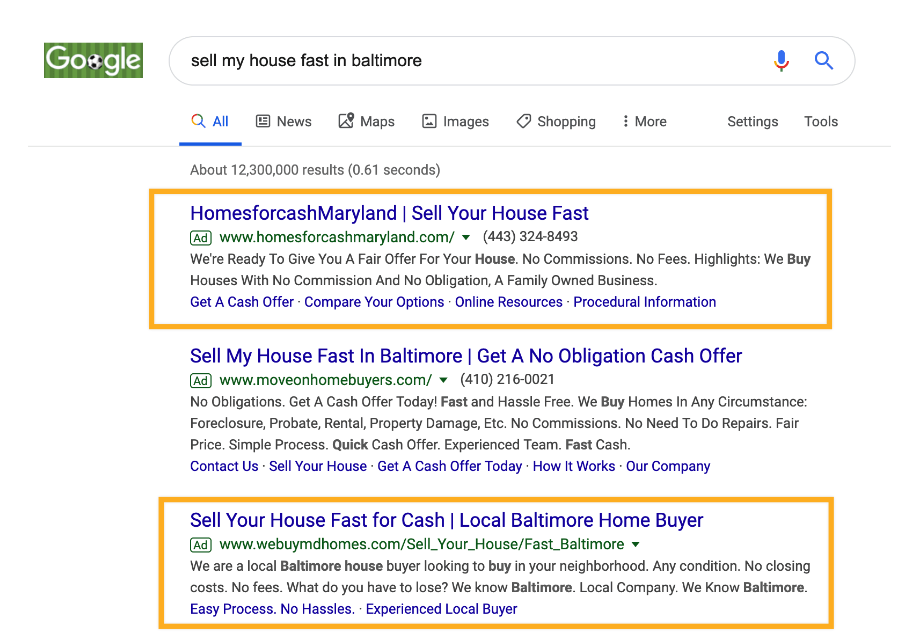Real estate PPC (Pay-Per-Click) is a powerful tool in any real estate business’s digital marketing arsenal. This strategy places your ads at the top of search engine results, driving targeted traffic and potential clients to your listings. The complexity of PPC lies in its many moving parts, from keyword research and ad creation to budget management and performance tracking. However, when done correctly, the potential of PPC for real estate is immense, leading to increased leads, higher conversion rates, and significant ROI.
In this article, we’ll discuss six crucial tips to help you navigate and master real estate PPC, ensuring your campaigns are both effective and profitable.
- Real Estate PPC Tip 1: Understand Your Target Audience
- Real Estate PPC Tip 2: Conduct Comprehensive Keyword Research
- Real Estate PPC Tip 3: Create Compelling Ad Copy
- Real Estate PPC Tip 4: Optimize Landing Pages
- Real Estate PPC Tip 5: Implement Effective Budgeting and Bidding Strategies
- Real Estate PPC Tip 6: Track and Analyze Performance
- Optimize Your Real Estate PPC with Flying V Group
- FAQs
Real Estate PPC Tip 1: Understand Your Target Audience
Understanding your target audience is fundamental to the success of your real estate PPC campaigns. Knowing who you are targeting allows you to tailor your ads to potential clients’ specific needs and behaviors.
Importance of Knowing Your Audience
- Precision Marketing: Tailored ads resonate more with potential clients, increasing engagement and conversion rates.
- Cost Efficiency: Focusing on the right audience reduces wasted ad spend on uninterested or irrelevant users.
- Higher ROI: Effective targeting leads to more qualified leads and ultimately, higher returns on your PPC investment.

Strategies to Define Target Demographics and Psychographics
- Demographics: Identify key demographic factors such as age, income level, location, and family status.
- Psychographics: Understand the lifestyle, interests, and pain points of your target audience to create more personalized ads.
- Behavioral Data: Analyze user behavior patterns to refine your audience segments further.
Use of Tools to Refine Targeting
- Google Analytics: Utilize Google Analytics to gather detailed insights about your website visitors, such as their geographic location, age, interests, and behaviors. This data helps in creating highly targeted PPC campaigns.
- CRM Data: Leverage data from your Customer Relationship Management (CRM) system to identify existing customer profiles and find similar audiences for your PPC campaigns. This ensures you are targeting users who are more likely to convert.
By thoroughly understanding your target audience, you can create more effective and personalized PPC campaigns that resonate with potential clients and drive higher engagement and conversions. This foundational step sets the stage for a successful real estate PPC strategy.
Real Estate PPC Tip 2: Conduct Comprehensive Keyword Research
Effective keyword research is the backbone of a successful real estate PPC campaign. It ensures your ads reach the right audience at the right time.
Role of Keyword Research in PPC Success
- Targeted Reach: Identifies the search terms potential clients use, allowing you to tailor your ads to those specific queries.
- Cost Efficiency: Helps allocate your budget to high-intent keywords, reducing waste on irrelevant clicks.
- Competitive Edge: Understanding keyword trends can help you outperform competitors.

Use of Tools
- Google Keyword Planner: Generates keyword ideas and shows estimated search volumes.
- Semrush: Provides insights into competitors’ keywords and ad strategies.
- SpyFu: Allows you to analyze competitors’ PPC campaigns and discover profitable keywords.
Emphasize Long-Tail and Negative Keywords
- Long-Tail Keywords: These are more specific and less competitive, attracting highly qualified leads (e.g., “luxury condos in Miami“).
- Negative Keywords: Exclude irrelevant terms to prevent your ads from appearing in unrelated searches, improving ad relevance and cost efficiency.
By conducting comprehensive keyword research, you can significantly enhance the effectiveness of your real estate PPC campaigns, ensuring you attract the right audience and maximize your ROI.
Real Estate PPC Tip 3: Create Compelling Ad Copy
Creating engaging and relevant ad copy is essential for capturing the attention of potential clients and driving clicks.
Importance of Engaging Ad Copy
- Attracts Attention: Well-written ad copy stands out in search results, encouraging users to click on your ad.
- Increases CTR: Relevant and compelling ads lead to higher click-through rates (CTR), improving your campaign’s overall performance.
Tips for Writing Effective Headlines and Descriptions
- Clear and Concise: Use straightforward language that clearly conveys your message. Avoid jargon and keep it simple.
- Highlight Benefits: Focus on the unique benefits your real estate services offer. For example, “Find Your Dream Home in Miami Today!”
- Include Keywords: Integrate relevant keywords naturally into your headlines and descriptions to improve ad relevance and search visibility.
Use of Ad Extensions
-
- Site Links: Add links to specific pages on your website, such as listings or contact information, to provide more options for users to explore.
- Callouts: Highlight key features or offers, such as “Free Consultation” or “New Listings Daily.”
- Location Extensions: Display your business address to attract local clients and make it easy for them to find you.

By crafting compelling ad copy and utilizing ad extensions, you can enhance the visibility and effectiveness of your real estate PPC campaigns, leading to higher engagement and conversions.
Real Estate PPC Tip 4: Optimize Landing Pages
Optimizing landing pages is crucial for converting PPC clicks into leads. Dedicated landing pages tailored to your ads ensure a seamless user experience.
Importance of Dedicated Landing Pages
- Higher Conversions: Specialized landing pages align with ad content, increasing the likelihood of conversions.
- Enhanced User Experience: They provide relevant information immediately, reducing bounce rates.
Best Practices for Landing Page Design
- Clear CTAs: Use prominent and actionable calls to action like “Schedule a Viewing” or “Get a Free Quote.”
- Mobile Optimization: Ensure your landing pages are fully responsive to cater to users on mobile devices.
- Fast Load Times: Optimize images and streamline code to reduce load times, keeping users engaged.
Consistency Between Ad Copy and Landing Page Content
- Message Match: Ensure that the headlines and content on your landing page mirror the ad copy. This maintains user trust and relevance.
- Visual Consistency: Use the same design elements and branding to create a cohesive experience.
By following these best practices, you can create landing pages that effectively convert PPC traffic into valuable leads, enhancing the overall success of your real estate PPC campaigns.
Real Estate PPC Tip 5: Implement Effective Budgeting and Bidding Strategies
Implementing effective budgeting and bidding strategies is essential for maximizing the ROI of your real estate PPC campaigns.
Setting Realistic PPC Budgets
- Based on Goals: Determine your budget by aligning it with specific campaign goals, such as lead generation or brand awareness.
- Market Conditions: Consider the competitiveness of your market. For instance, high-demand areas may require a higher budget to outbid competitors.
Overview of Bidding Strategies
- Manual CPC: Offers full control over bids for each keyword, ideal for those who want to manage costs precisely.
- Automated Bidding: Uses algorithms to optimize bids for conversions. Strategies include:
- Maximize Clicks: Focuses on getting the most clicks within your budget.
- Target CPA (Cost Per Acquisition): Sets bids to achieve the desired cost per acquisition, optimizing for more conversions at a set cost.
Tips for Adjusting Bids Based on Performance Data
- Monitor KPIs: Regularly review key performance indicators (KPIs) like click-through rates (CTR), conversion rates, and cost per conversion.
- Adjust Bids: Increase bids on high-performing keywords to capture more traffic. Decrease bids on underperforming keywords to allocate the budget more efficiently.
- Use Bid Adjustments: Implement bid adjustments for different times of the day, geographic locations, or devices to optimize campaign performance.
Setting realistic budgets and employing strategic bidding ensures that your real estate PPC campaigns are cost-effective and yield high returns.
Real Estate PPC Tip 6: Track and Analyze Performance
Tracking and analyzing performance is crucial for the success of your real estate PPC campaigns. Monitoring key metrics helps identify areas for improvement and ensures you achieve your goals.
Importance of Monitoring Key Metrics
- CTR (Click-Through Rate): Measures the percentage of people who click on your ad. A higher CTR indicates effective ad copy.
- Conversion Rate: The percentage of clicks that result in a desired action, such as filling out a contact form.
- CPA (Cost Per Acquisition): The average cost to acquire a new lead. Lowering CPA indicates more efficient use of your budget.
- ROI (Return on Investment): Calculates the profitability of your PPC campaigns by comparing the revenue generated to the amount spent.
Tools for Tracking and Analyzing Campaign Performance
- Google Analytics: Provides detailed insights into website traffic and user behavior.
- PPC Management Software: Tools like Semush and WordStream help track and optimize PPC performance.
Strategies for Continuous Optimization
-
-
- Regular Review: Continuously monitor performance metrics to identify trends and areas for improvement.
- A/B Testing: Experiment with different ad copies, landing pages, and bidding strategies to see what works best.
- Adjust Campaigns: Based on performance data, adjust your keywords, bids, and targeting to optimize results.
-
![]() (Image Courtesy – Funnel Science)
(Image Courtesy – Funnel Science)
You can make informed decisions that drive better results and maximize your investment by diligently tracking and analyzing your PPC campaign performance.
Optimize Your Real Estate PPC with Flying V Group
Mastering real estate PPC requires expertise, strategy, and continuous optimization. From understanding your target audience and conducting comprehensive keyword research to creating compelling ad copy and optimizing landing pages, each step is crucial for maximizing your ROI. Implementing effective budgeting and bidding strategies and rigorously tracking and analyzing performance ensures your campaigns remain efficient and effective.
At Flying V Group, we specialize in crafting high-converting real estate PPC campaigns. Our team of experts understands the complexities of PPC and brings deep industry insights to every project. We handle everything from keyword research and ad creation to budget management and performance tracking, ensuring your campaigns drive results. Don’t navigate the intricate world of PPC alone. Partner with Flying V Group to elevate your real estate marketing efforts and achieve unparalleled success. Contact us today to start transforming your PPC strategy and see tangible results!
FAQs
1. What is real estate PPC?
Real estate PPC (Pay-Per-Click) is a digital advertising model where real estate businesses pay a fee each time their ad is clicked. It’s used to drive targeted traffic to property listings and increase lead generation.
2. How much does real estate PPC cost?
The cost of real estate PPC varies depending on factors like location and competition. Generally, costs can range from $0.50 to $5.00 per click, with a cost per lead averaging between $10 and $20.
3. Why is keyword research important for real estate PPC?
Keyword research identifies the search terms potential clients use, allowing you to target ads effectively. It helps in reaching the right audience, improving ad relevance, and maximizing ROI by focusing on high-intent keywords.
4. How can I improve my PPC ad performance?
Improve PPC ad performance by using engaging ad copy, relevant keywords, and ad extensions. Regularly track key metrics like CTR and conversion rates, and optimize your campaigns based on performance data.
5. What tools can help manage real estate PPC campaigns?
Tools like Google Analytics, Google Keyword Planner, SEMRush, and PPC management software (e.g., WordStream) are essential for tracking performance, conducting keyword research, and optimizing PPC campaigns for better results.






0 Comments